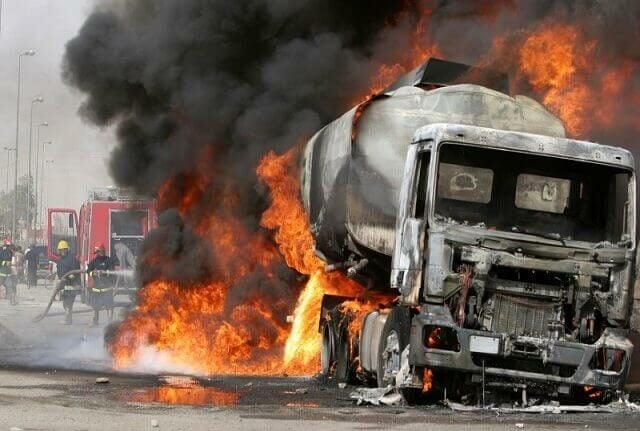The tragic fuel tanker explosion in Niger State on October 21, 2025, has once again underscored the perilous state of road safety in Nigeria and across West Africa. A tanker carrying petrol overturned on the Bida-Agaie road near Essan and Badeggi communities in Katcha Local Government Area, exploding as locals attempted to scoop fuel.
Initial reports from the Federal Road Safety Corps (FRSC) indicate at least 35 deaths and 40 injuries, with victims including women and children burned beyond recognition. This incident, occurring on a poorly maintained highway, reflects broader infrastructure woes in Northern Nigeria, where crumbling roads and lax regulations turn routine transport into deadly hazards.
As similar accidents continue to plague the region, this newspaper urges comprehensive regulatory reforms to prevent such incidents, drawing on recent cases to highlight the urgent need for systemic change. It also addresses the moral dimension of fuel scooping, an act that not only courts death but constitutes theft, robbing victims of their investments without consent, and signalling a societal shift from assistance to opportunism.
Northern Nigeria’s road network, vital for economic connectivity, is plagued by deficiencies that exacerbate accident risks. In Niger State, the potholes and narrow lanes on the Bida-Agaie road contributed to the tanker’s overturn, a common trigger for explosions. Similar conditions prevail across the North, where heavy rainfall and neglect exacerbate deterioration. A 2024 World Bank report notes that Nigeria’s road maintenance funding gap stands at N1.5 trillion annually, leading to 70 per cent of Northern highways being in poor condition.
This infrastructure decay not only causes accidents but also hinders emergency responses, as seen in the Niger blast, where delayed medical aid worsened outcomes. The moral question arises here. Fuel scooping, while driven by poverty, is a form of outright theft. The product represents someone’s investment, transported with authorisation only for the owner or consignee. Scooping without consent exploits the unfortunate, transforming misfortune into opportunism. In Nigeria’s past, communities assisted accident victims. Today, such acts reflect a societal erosion where empathy yields to greed, endangering lives and perpetuating cycles of loss.
Tanker explosions, often involving petroleum products, are a recurrent scourge. In 2025 alone, Northern states have witnessed multiple incidents. In Jigawa State, a tanker crash in Majia Town on October 15 killed 94 and injured 50 when villagers siphoned fuel, igniting a fireball. Kano State reported a similar explosion in September, claiming 20 lives on the Zaria-Kano highway due to brake failure.
These cases mirror the Niger tragedy, where poverty drives risky behaviour like fuel scooping, turning accidents into mass casualties. FRSC data shows over 5,000 road deaths in Nigeria in the first half of 2025, with tankers involved in 15 per cent, predominantly in the North. West Africa faces parallel issues. In Ghana, a 2024 tanker blast killed 12, while Sierra Leone’s 2021 Freetown explosion claimed 151 lives, highlighting regional vulnerabilities. The moral imperative is clear. Scooping is not just dangerous but unethical, denying owners their property rights and exacerbating victims’ plight.
Analysis reveals regulatory lapses as a core problem. Nigeria’s Petroleum Industry Act 2021 mandates tanker safety standards, yet enforcement is weak. The FRSC and the Department of Petroleum Resources (DPR) conduct tanker inspections, but corruption and inadequate resources hinder their effectiveness. In Zamfara State, a September 2025 audit revealed 40 per cent of tankers lacked valid licences, contributing to spills.
Driver fatigue, often from long hauls on bad roads, is another factor. The Niger driver reportedly lost control due to poor visibility and road defects. Social media sentiments decry this, with users blaming “government negligence” for recurring deaths.
Experts from the African Development Bank attribute 80 per cent of accidents to human error and poor infrastructure, costing West Africa US$7.2 billion annually in GDP losses. The moral angle adds depth. By framing scooping as theft, society must confront how economic desperation normalises criminality, eroding communal values that once prioritised aid over exploitation.
Health and environmental impacts are profound. Explosions cause severe burns and respiratory issues, overwhelming hospitals in states like Niger, where facilities lack burn units. Long-term, spills contaminate water sources, as in a Kaduna incident in July 2025, where a tanker spill polluted farmlands, affecting 500 households. Economically, disruptions halt vital trade.
The Niger blast closed the road for days, delaying the movement of goods and services to Abuja. In West Africa, ECOWAS’s Road Safety Strategy 2021 aims to halve deaths by 2030; however, implementation lags, with Nigeria’s compliance rate at 60 per cent. Morally, these tragedies expose a collective failure.
Regulatory reforms are essential. Strengthen FRSC through digital tracking for tankers, as piloted in Lagos. Enforce mandatory rest periods for drivers and roadworthiness certifications, with harsher penalties for violations. Invest in Northern infrastructure, allocating N500 billion from the 2026 budget for highways. Regional cooperation via ECOWAS could harmonise standards, reducing cross-border risks. Public education campaigns, like NAFDAC’s anti-scooping drives, must intensify, emphasising the moral wrong of theft. Experts from World Health Organisation (WHO) advocate integrated approaches, combining regulation with community vigilance.
In our opinion, the Niger explosion is a wake-up call. By pushing for reforms and moral reawakening against theft in crises, Nigeria can avert this epidemic, saving lives and bolstering regional stability.





